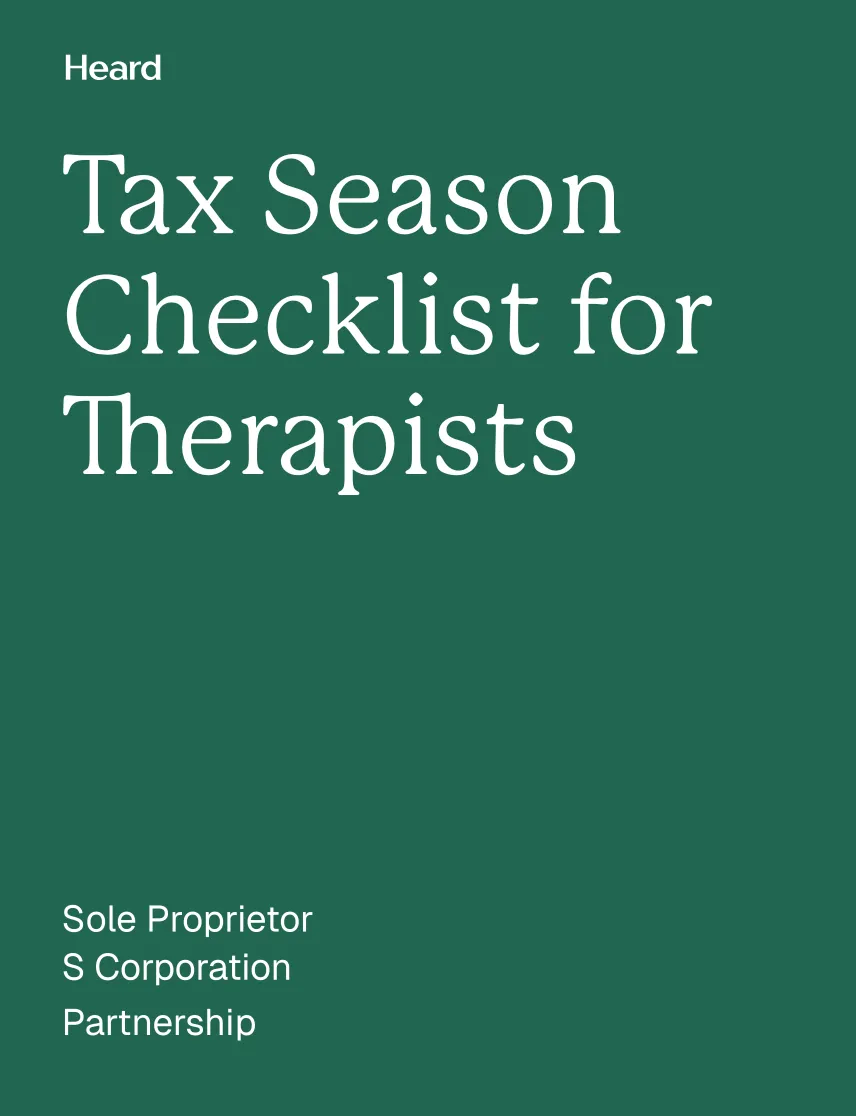If your therapy practice serves clients in states outside your own, there is a strong chance it will affect how you file and pay your taxes.
Most therapists who see regular clients outside their state do so remotely, in the course of practicing telehealth. But rules about out-of-state business also apply if you travel across state lines to treat a client on a recurring basis, or if you travel to facilitate workshops or lead group therapy sessions.
Here’s how to determine if you’re required to pay taxes in multiple states, and what to do if you are.
{{consult}}
What is income tax nexus?
First things first: The IRS doesn’t care what state you do business in. You’re required to pay income tax on 100% of your taxable income. That applies whether you earn your income in one state or in all 50.
It’s individual states that care when and where you earn income; if you earn income in a particular state, that particular state wants to know about it. Operating in multiple states affects only your state-level tax filing and payments, not your federal tax return.
And while they’re unlikely to apply to your therapy practice, there are other triggers—besides earning income—that may oblige you to pay taxes in a particular state. For instance, if you have multiple locations for your business in multiple states, or if you store inventory in a state other than the state where your business is registered, you could trigger tax nexus.
Tax nexus is your obligation to pay taxes in a particular state. Once you fall within a state’s tax nexus, you’re typically required to pay taxes there. There are two types of nexus relevant to most small businesses: sales tax nexus and income tax nexus. (Other types—like use tax, which may apply to large purchases like vehicles—aren’t typically relevant to therapy practices.)
If you sell goods or services that qualify for sales tax, and you meet the conditions for sales tax nexus in that state, you’ll have to remit and pay sales tax to the state tax authority.
However, it’s unlikely your therapy practice will trigger sales tax nexus. States don’t charge sales tax on mental health services like therapy.
Income tax nexus is a more pressing matter for your therapy practice. If you do business and earn income in another state, you may be required to pay state income tax. Providing telehealth services to clients in another state is one way to trigger income tax nexus.
Finally, if you do plan on doing business in another state, the procedures you must follow vary depending on whether you are a sole proprietorship or a registered business (eg. an LLC).
How to determine if you fall within income tax nexus
Each state has its own rules for determining whether a company falls within its income tax nexus. And as business models change—therapists providing therapy to out-of-state clients is a good example—courts are more wide-ranging in what they determine to be nexus-triggering activities.
If you serve a client in a different state in a recurring capacity—that is, not as a one-off, one-time treatment session—you may fall within that state’s income tax nexus.
That being said, different states also have different income thresholds for determining whether you trigger sales tax nexus. Even if you earn income in a different state, you may not earn enough per year to qualify you to pay income tax.
Remember: states set their own rules for what determines income tax nexus. If you’re unsure whether serving a client residing in a particular state will trigger tax nexus, get in touch with:
- The relevant Secretary of State’s office
- The state’s SBA office
- The state’s counselor certification board
These options are all free, save the time it takes to write emails or sit through call waiting music. If your budget allows, you can also hire an accounting firm that serves small businesses in multiple states. Besides telling you whether you qualify for tax nexus, they may also be able to offer strategies for reducing your tax burden or making your filing simpler.
Paying taxes in multiple states as a sole proprietor therapist
If you’re a sole proprietor and you trigger the income tax nexus in another state, you are required to file and pay income tax in that state. The process for doing so varies on a state-by-state basis, and you’ll need to enquire with the relevant authorities or organizations—or a qualified accountant—to get started.
A word of warning, however: operating as a sole proprietor gives you almost no legal or financial liability protection. The problem becomes even more pronounced when you operate in multiple states, and multiple courts and legal authorities come into play. An otherwise minor dispute with a client over unpaid fees, for instance, could become an expensive and drawn-out proceeding.
If your practice is well-established enough that you are taking on clients in multiple states—and going through the licensing process needed to practice outside your own state, too—then it’s a good idea to consult with an accountant and register as an LLC or an S corporation.
{{consult}}
Paying taxes in multiple states when your therapy practice is a registered business
If your therapy practice is registered as an LLC or a C corporation in the state where it’s based, and you plan to do business in other states, you have three options: Do business illegally in other states, create multiple businesses in multiple states, or apply for foreign qualification in the states where you plan to practice.
Spoiler warning: You should probably just apply for foreign qualification. But here’s a closer look at those three options:
1. Doing business illegally
If your registered business earns income in a different state, that state wants to know about it. If you fail to notify the state and they find out after the fact, they are likely to hit you with a hefty penalty charge and may demand you pay them back taxes.
Naturally, this approach—flying by the seat of your pants and hoping no-one notices—is not recommended.
2. Registering multiple businesses
If you’re registered in one state and you plan to practice in another, you have the option to register a separate business in the other state.
For instance, suppose your therapy practice is an LLC in West Virginia, but you want to treat clients in California. You could register a therapy practice in California—complete with a separate business name, bank account, and income tax filings—and use it to do business there.
The biggest drawback to this approach is cost, with over-complexity coming in a close second.
Not only does it cost money to register an LLC in a particular state, but you may be required to pay annual franchise tax to maintain your LLC.
It also creates a lot of extra complexity you need to deal with. Not only are you required to go through the process of registering a second business, but you need to maintain a separate bank account and a separate set of books for it, as well as filing a separate tax return. The cost could easily outweigh the benefits.
3. Applying for foreign qualification for your therapy practice
Remember how, if you’re going to earn income in a particular state, that state almost always wants you to tell them about it?
The way you tell them about it is by requesting foreign qualification with the state.
In the eyes of the state, your business is “foreign” in the sense that it’s originally registered and based in a different state. (It’s “domestic” to a different state.)
When you become foreign qualified with a state, you’re giving them information about your business, establishing a relationship with the state tax authority, and qualifying the fact that you intend to file annual reports (much as you file annual reports for an LLC in your home state) and (potentially) state tax returns in that particular state.
Foreign qualifications are typically handled by the Secretary of State or their equivalent. Also, each state has different application forms, processes, and fees associated with filing for foreign qualification. (Surprise, surprise.) You can get a state-by-state breakdown of fees and typical wait times for filing from this 50 state table.
{{consult}}
What you need to get foreign qualification for your therapy practice
While each state differs, you should be prepared to provide the following information when applying for foreign qualification:
- The date and state of your practice’s formation
- Your principal place of business
- Your business address in the state where you’re based
- Information on your business’s principal officers/shareholders
- Contact information for your registered agent where you’re based
You’ll also need the following:
- A Certificate of Good Standing from your home state, which proves that you’re registered and in compliance
- A business name to be used in the new state where you intend to practice
- A registered agent in the new state where you will be practicing
After paying the associated fees, completing the application, and waiting for your application to be processed, you can expect:
- To receive a Certificate of Authority giving you the right to operate in the state
- To start filing annual reports in the state where you’re now practicing
- To update the Secretary of State if there are any major changes to your business (eg. new business structure, new home location, etc.)
Since the process of applying for foreign qualification can be complex and time-consuming, many national accounting firms offer to complete and file your foreign qualification application for a flat fee.
Keep in mind that, even if you have foreign qualification in a particular state, you may not need to pay taxes there. That is, the state may require you to have foreign qualification to operate there, even if you do not trigger its income tax nexus.
An example would be if you had foreign qualification in a particular state, but you did not earn enough income there to cross the state’s threshold for income tax nexus.
Make sure you’re clear on income tax nexus thresholds and any other regulations that may affect your tax filing in the state where you’ll be operating.
—
Doing business in multiple states introduces some new complexities to running your therapy practice. But if you run a telehealth practice, the good news is that you may be able to write off a portion of your home from your income tax. Learn more about the home office deduction for therapists.
This post is to be used for informational purposes only and does not constitute legal, business, or tax advice. Each person should consult their own attorney, business advisor, or tax advisor with respect to matters referenced in this post.
Bryce Warnes is a West Coast writer specializing in small business finances.
{{cta}}
Manage your bookkeeping, taxes, and payroll—all in one place.

Discover more. Get our newsletter.
Get free articles, guides, and tools developed by our experts to help you understand and manage your private practice finances.
Lock in our lowest prices of the year, plus exclusive add-ons. Sign up by December 31 to take advantage of these savings.
Schedule a free consult




